九年级上Unit4
2020人教版九年级英语上Unit4课文重难点讲解与练习
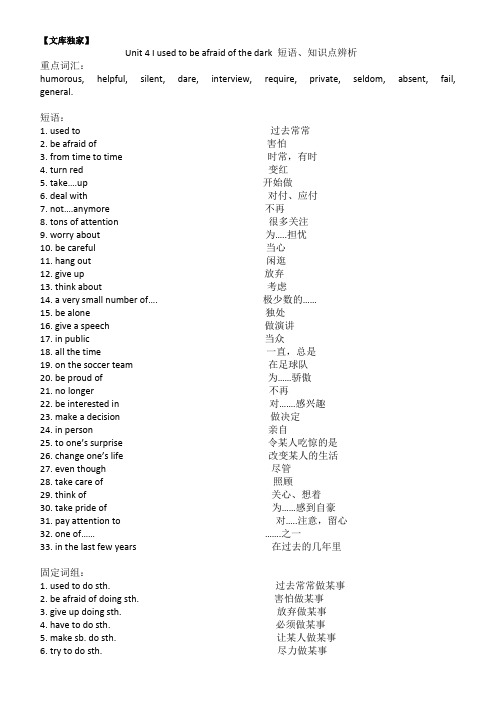
【文库独家】Unit 4 I used to be afraid of the dark 短语、知识点辨析重点词汇:humorous, helpful, silent, dare, interview, require, private, seldom, absent, fail, general.短语:1. used to 过去常常2. be afraid of 害怕3. from time to time 时常,有时4. turn red 变红5. take….up 开始做6. deal with 对付、应付7. not….anymore 不再8. tons of attention 很多关注9. worry about 为…..担忧10. be careful 当心11. hang out 闲逛12. give up 放弃13. think about 考虑14. a very small number of…. 极少数的……15. be alone 独处16. give a speech 做演讲17. in public 当众18. all the time 一直,总是19. on the soccer team 在足球队20. be proud of 为……骄傲21. no longer 不再22. be interested in 对…….感兴趣23. make a decision 做决定24. in person 亲自25. to one’s surprise 令某人吃惊的是26. change one’s life 改变某人的生活27. even though 尽管28. take care of 照顾29. think of 关心、想着30. take pride of 为……感到自豪31. pay attention to 对…..注意,留心32. one of………….之一33. in the last few years 在过去的几年里固定词组:1. used to do sth. 过去常常做某事2. be afraid of doing sth. 害怕做某事3. give up doing sth. 放弃做某事4. have to do sth. 必须做某事5. make sb. do sth. 让某人做某事6. try to do sth. 尽力做某事7. adj. + enough to do sth. 足够……而能做某事8. be prepared to do sth. 准备做某事9. see sb. doing sth. 看见某人在做某事10. take up doing sth. 开始做某事11. begin to do sth. 开始做某事12. require sb. to do sth. 要求某人做某事13. decide to do sth. 决定做某某14. make a decision to do sth. 决定做某事15. It’s hard to believe that……很难相信……….16. It has been + 一段时间+ since + 从句自从……以来已经有很长的时间了17. dare to do sth. 敢于做某事18. It’s + adj. + for sb. + to do sth. 对某人来说做某事是……的重点句型:1. I used to be afraid of the dark. 我过去常常怕黑。
九年级上册英语第四单元
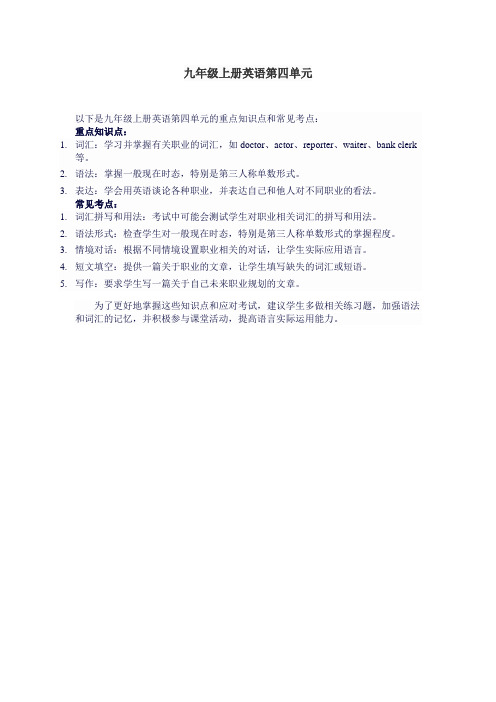
九年级上册英语第四单元
以下是九年级上册英语第四单元的重点知识点和常见考点:
重点知识点:
1.词汇:学习并掌握有关职业的词汇,如doctor、actor、reporter、waiter、bank clerk
等。
2.语法:掌握一般现在时态,特别是第三人称单数形式。
3.表达:学会用英语谈论各种职业,并表达自己和他人对不同职业的看法。
常见考点:
1.词汇拼写和用法:考试中可能会测试学生对职业相关词汇的拼写和用法。
2.语法形式:检查学生对一般现在时态,特别是第三人称单数形式的掌握程度。
3.情境对话:根据不同情境设置职业相关的对话,让学生实际应用语言。
4.短文填空:提供一篇关于职业的文章,让学生填写缺失的词汇或短语。
5.写作:要求学生写一篇关于自己未来职业规划的文章。
为了更好地掌握这些知识点和应对考试,建议学生多做相关练习题,加强语法和词汇的记忆,并积极参与课堂活动,提高语言实际运用能力。
人教版(新目标)初中英语九年级上册Unit4知识点汇总

humorous[ˈhjuːmərəs]有幽默感的;滑稽有趣的silent[ˈsaɪlənt]不说话的;沉默的helpful['helpfəl]有用的;有帮助的from time to time[frɒm//taɪm//tuː//taɪm]时常;有时score[skɔː]得分;打分background[ˈbækɡraʊnd]背景interview[ˈɪntəvjuː]采访;面试 n. Asian[ˈeɪʃ(ə)nˌˈeɪʒ(ə)n]亚洲的;亚洲人的,亚洲人deal with对付;应付dare[deə]敢于;胆敢private[ˈpraɪvɪt]私人的;私密的guard[ɡɑːd]警卫;看守v.守卫;保卫require[rɪˈkwaɪə]需要;要求European[jʊərəˈpiːən]欧洲的;欧洲人的British['brɪtɪʃ]英国的;英国人的speech[spiːtʃ]讲话;发言ant[ænt]蚂蚁insect[ˈɪnsekt]昆虫influence[ˈɪnflʊəns]影响seldom[ˈseldəm]不常;很少proud[praʊd]自豪的;骄傲的be proud of为⋯⋯骄傲;感到自豪absent[ˈæbsənt]缺席;不在fail[feɪl]失败;未能(做到)examination[ɪgˌzæmɪ'neɪʃən]考试;审查boarding school寄宿学校in person亲身;亲自exactly[ɪg'zæktli]确切地;精确地pride[praɪd]自豪;骄傲take pride in为⋯⋯感到自豪grandson[ˈɡrændsʌn]孙子;外孙general[ˈdʒenər(ə)l]普遍的;常规的;总的将军introduction[ɪntrəˈdʌkʃ(ə)n]介绍Paula 葆拉(女名)Alfred 艾尔弗雷德(男名)Billy 比利(男名)Candy 坎迪(女名)Jerry 杰里(男名);杰丽(女名)Emily 埃米莉(女名)02 U n i t 4 知识梳理Unit4 I used to be afraid of the dark.【重点短语】ed to do 过去常常做2.deal with 对付应付3.be proud of 为……骄傲,感到自豪4.take pride in 为……感到自豪5.fromtime to time 时常,有时6.i n public 公开地7.i n person 亲身,亲自8.t ake up sth 开始做,接受,占用9.not……anymore不再10.worry about 为……担忧11.hang out 闲逛12.thinkabout 考虑13.be alone 独处14.on the soccer team 在足球队15.no longer 不再16.make a decision 做决定17.to one’s surprise 令某人吃惊的是18.even though 尽管19.pay attention to 对……注意,留心20.in the last few years 在过去的几年里21.be afraid of 害怕22.turn red 变红23.tons of attention 很多关注24.be careful 当心25.give up 放弃26.a very small number of …极少数的……27.give a speech 作演讲28.all the time 一直总是29.be interested in 对……感兴趣30.change one’s life 改变某人的生活31.take care of 照顾32.one of…, ……之一【重点句型】1. I used to be afraid of the dark. 我过去常常前害怕黑暗.2.I go to sleep with my bedroom light on. 我开着卧室的灯睡觉.3.I used to spend a lot of time playing games with my friends. 以前我常常花很多时间和我的朋友们玩游戏.4.I hardly ever have time for concerts.我几乎没有时间去听音乐会.5.My life has changed a lot in the last few years.我的生活在过去几年里改变了很多.6.It will make you stressed out.那会使你紧张的.7.It seems that Yu Mei has changed a lot.玉梅似乎变化很大.03词汇精讲1.silentsilent是形容词,意为“沉默的;无言的”,其名词形式为silence。
人教版(新目标)初中英语九年级上册 Unit 4

01Unit4 单词humorous[ˈhjuːmərəs]有幽默感的;滑稽有趣的silent[ˈsaɪlənt]不说话的;沉默的helpful['helpfəl]有用的;有帮助的from time to time[frɒm//taɪm//tuː//taɪm]时常;有时score[skɔː]得分;打分background[ˈbækɡraʊnd]背景interview[ˈɪntəvjuː]采访;面试n.Asian[ˈeɪʃ(ə)nˌˈeɪʒ(ə)n]亚洲的;亚洲人的,亚洲人deal with对付;应付dare[deə]敢于;胆敢private[ˈpraɪvɪt]私人的;私密的guard[ɡɑːd]警卫;看守v.守卫;保卫require[rɪˈkwaɪə]需要;要求European[jʊərəˈpiːən]欧洲的;欧洲人的British['brɪtɪʃ]英国的;英国人的speech[spiːtʃ]讲话;发言ant[ænt]蚂蚁insect[ˈɪnsekt]昆虫influence[ˈɪnflʊəns]影响seldom[ˈseldəm]不常;很少proud[praʊd]自豪的;骄傲的be proud of为⋯⋯骄傲;感到自豪absent[ˈæbsənt]缺席;不在fail[feɪl]失败;未能(做到)examination[ɪgˌzæmɪ'neɪʃən]考试;审查boarding school寄宿学校in person亲身;亲自exactly[ɪg'zæktli]确切地;精确地pride[praɪd]自豪;骄傲take pride in为⋯⋯感到自豪grandson[ˈɡrændsʌn]孙子;外孙general[ˈdʒenər(ə)l]普遍的;常规的;总的将军introduction[ɪntrəˈdʌkʃ(ə)n]介绍Paula 葆拉(女名)Alfred 艾尔弗雷德(男名)Billy 比利(男名)Candy 坎迪(女名)Jerry 杰里(男名);杰丽(女名)Emily 埃米莉(女名)02Unit4 知识梳理Unit4 I used to be afraid of the dark.【重点短语】ed to do 过去常常做2.deal with 对付应付3.be proud of 为……骄傲,感到自豪4.take pride in 为……感到自豪5.from time to time 时常,有时6.in public 公开地7.in person 亲身,亲自8.take up sth 开始做,接受,占用9.not……anymore 不再10.worry about 为……担忧11.hang out 闲逛12.think about 考虑13.be alone 独处14.on the soccer team 在足球队15.no longer 不再16.make a decision 做决定17.to one’s surprise 令某人吃惊的是18.even though 尽管19.pay attention to 对……注意,留心20.in the last few years 在过去的几年里21.be afraid of 害怕22.turn red 变红23.tons of attention 很多关注24.be careful 当心25.give up 放弃26.a very small number of …极少数的……27.give a speech 作演讲28.all the time 一直总是29.be interested in 对……感兴趣30.change one’s life 改变某人的生活31.take care of 照顾32.one of…, ……之一【重点句型】1. I used to be afraid of the dark.我过去常常前害怕黑暗.2.I go to sleep with my bedroom light on.我开着卧室的灯睡觉.3. I used to spend a lot of time playing games with my friends.以前我常常花很多时间和我的朋友们玩游戏.4. I hardly ever have time for concerts.我几乎没有时间去听音乐会.5. My life has changed a lot in the last few years.我的生活在过去几年里改变了很多.6. It will make you stressed out.那会使你紧张的.7. It seems that Yu Mei has changed a lot.玉梅似乎变化很大.03词汇精讲1. silentsilent是形容词,意为“沉默的;无言的”,其名词形式为silence。
人教版九年级上英语知识清单unit4

Ⅰ. Words1.medical adj. 医学的;n.药medicine2.research n.研究;调查3.tie n.领带v.捆绑tie---tying4.plenty pron. 充足;大量5.circle n.圈子;阶层6.knowledgeable adj.知识渊博的knowledge n.知识know v. know-knew---known7.shelf n. 书架(pl. shelves)8.cover v. 覆盖n. 封面9.deep adj. 深的deeply adv. 深深地10.downstairs adv.在楼下upstairs adv,在楼上11.correct adj. 对的right12.burn v. 烧伤burn-burnt-burnt也可作n.热或酸所造成的伤害或伤痕13.knee n.膝盖14.hurt(-hurt-hurt) v.感到疼痛15.offer v. 提供16.refuse v. 拒绝lion n. 百万(hundred)/thousand/ billion)18.pimple n.小脓疱;丘疹19.energetic adj. 有活力的; energy n. 精力20.confident adj. 自信的confidence n. 自信21.permission n.允许permit v.(permitted,permitted)22.bother v. 打扰23.fairy adv.相当地24.represent v.代表n. representative25.aid n. 急救first-aid急救26.nearby adj.附近的V.附近=in the neighborhood27.press v. 按;压pressure n.压力28.pain n. 疼痛painful adj. 疼痛的29.treat v.对待30.Spotty adj.多斑点的,发疹的(文中用作人名)31.worry n.烦恼v.担心worried adj.担心的32.herself pron.她自已33.annoy v.使生气adj. annoyed (主感) annoying (客令)34.listener n.听众35.creative adj. 有创造力的36.helpful adj. 有帮助的helpless adj.无帮助的help v. &n.37.rest n.剩余部分;休息Ⅱ. Phrases1.what if 如果…怎么办2.not...in the slightest = not... at all一点也不3.plenty of=a lot of 相当多的4.let sb down =made sb disappointed /frustrated让某人失望e up with sth 提出=think upe out 出版;出来;开花7.medical research医学研究8.wear a shirt and tie 穿衬衣打领带9.with/ without permission (没有)经过允许10.ask for sb.’s permission请求某人的允许11.be confident of sth. 对…很自信have confidence in sb. 对…有信心12.a small/big circle of …一小/大圈子…e top = become the top student成为优生14.the rest of 剩余的15.have experience (in) doing sth. 有经验做某事16.by accident=by chance 意外,偶然17.cover sth. by/with 用…盖住18.be covered by/with 被…覆盖19.hurt oneself 伤到自己20.fall downstairs 摔下楼21.hurry to do 匆忙做某事22.burn oneself 烧伤自己23.the danger of doing sth. 做…的危险24.hide(-hid-hidden) sth. from sb. 把…藏得远离某人25.offer sb sth= offer sth to sb 给某人提供…26.put it in the bank 把它存进银行27.do a personality survey 做一个关于性格的调查28.ask you to be in a movie请你演一部电影=to be an actor in a movie29.get pimples 长粉刺30.enjoy the company of other people 喜欢他人陪伴31.a first-aid book 医疗救助32.on a nearby shelf 在一个附近的书架上33.medical help 医疗救助34.press sth hard 用力压…35.the burn area 烧伤的部位36.running water 自来水37.an Internet friend 一个网友38.get along/on well with sb. 与某人相处得好;…进行得怎么样39.give it to charity 把它给慈善机构40.introduce sb. to sb. 把某人介绍给某人41.get nervous 变得紧张42.take/have a long walk 长时间散步43.give advice on/about… 提出关于…的建议44.be friends with sb 和某人成为朋友make friends with sb 与某人交朋友45.would rather do sth than do sth=prefer to do sth rather than do sth=prefer doing sth. to doing sth.宁愿做…而不愿做(rather than/instead of)46.let /make sb.(not) do 让…(不)做某事47.in public = in a public place 在公共场合48.make/give speeches做演讲49.wait for sb. to do sth.等待某人做某事50.the solutions to . . .…的解决方法51.do sth. alone=do sth. by oneself 独自做某事Ⅲ. Sentences1.——如果你有一百万美元,你会做什么? What would you do if you had one million dollars?——我会将它捐赠给慈善事业。
人教版九年级上册英语unit4单词知识点
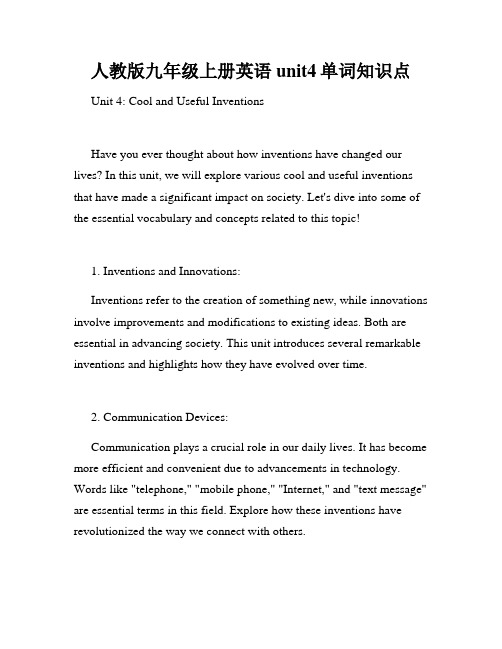
人教版九年级上册英语unit4单词知识点Unit 4: Cool and Useful InventionsHave you ever thought about how inventions have changed our lives? In this unit, we will explore various cool and useful inventions that have made a significant impact on society. Let's dive into some of the essential vocabulary and concepts related to this topic!1. Inventions and Innovations:Inventions refer to the creation of something new, while innovations involve improvements and modifications to existing ideas. Both are essential in advancing society. This unit introduces several remarkable inventions and highlights how they have evolved over time.2. Communication Devices:Communication plays a crucial role in our daily lives. It has become more efficient and convenient due to advancements in technology. Words like "telephone," "mobile phone," "Internet," and "text message" are essential terms in this field. Explore how these inventions have revolutionized the way we connect with others.3. Transportation Advancements:The transportation sector has seen significant improvements throughout history. From the invention of the wheel to the development of electric vehicles, transportation has become faster and greener. Essential terms such as "airplane," "bicycle," "subway," and "spacecraft" will help us better understand this area.4. Medical Breakthroughs:Medical inventions have saved countless lives and transformed healthcare practices. Recognize terms such as "vaccine," "antibiotics," "MRI," and "prosthetics." Discover how these innovations have extended human lifespan and enhanced the quality of life.5. Environmentally Friendly Inventions:With rising environmental concerns, the importance of eco-friendly inventions cannot be overlooked. Terms such as "solar energy," "wind power," "recycling," and "biodegradable" are crucial in this context. Learn how these inventions contribute to a sustainable future.6. Everyday Household Inventions:Our homes are filled with various inventions that make our lives more comfortable and efficient. Terms such as "refrigerator," "washingmachine," "microwave," and "dishwasher" are essential when discussing daily household tasks. Explore how these inventions have simplified our daily routines.7. Entertainment and Multimedia:Entertainment has evolved with the advent of new technologies. Terms like "television," "video game," "virtual reality," and "streaming" have become integral to our leisure activities. Discover how these inventions have shaped our entertainment preferences.8. Technological Advancements:Technology is rapidly advancing, bringing about transformative changes in society. Familiarize yourself with terms such as "robotics," "artificial intelligence," "augmented reality," and "nanotechnology." Explore how these advancements are shaping various industries.9. Patents and Copyrights:Protecting the rights of inventors is crucial to encourage innovation and creativity. Understand the terms "patent" and "copyright" and their significance in safeguarding intellectual property. Learn how inventors can secure their innovative ideas.In conclusion, this unit explores a wide range of inventions that have significantly impacted our lives. By understanding the vocabulary and concepts related to these inventions, we gain a deeper appreciation for the constant progress in various fields. As we continue to innovate, who knows what remarkable inventions the future holds?。
人教版九年级英语上册Unit 4短语、句型及语法
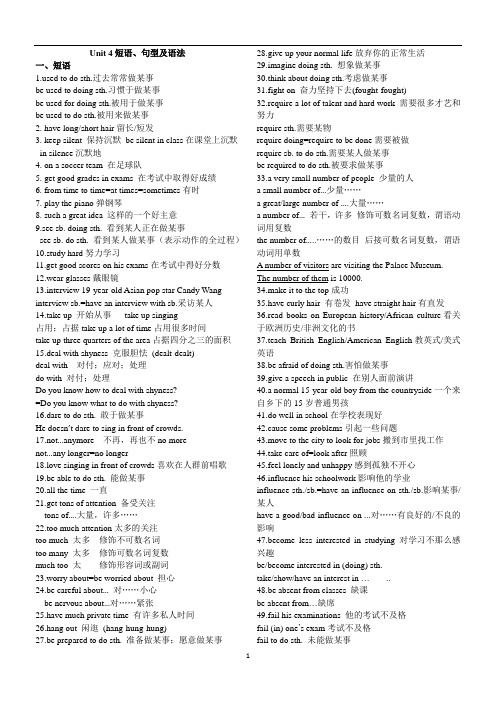
Unit 4短语、句型及语法一、短语ed to do sth.过去常常做某事be used to doing sth.习惯于做某事be used for doing sth.被用于做某事be used to do sth.被用来做某事2. have long/short hair留长/短发3. keep silent 保持沉默be silent in class在课堂上沉默in silence沉默地4. on a soccer team 在足球队5. get good grades in exams 在考试中取得好成绩6. from time to time=at times=sometimes有时7. play the piano弹钢琴8. such a great idea 这样的一个好主意9.see sb. doing sth. 看到某人正在做某事see sb. do sth. 看到某人做某事(表示动作的全过程)10.study hard努力学习11.get good scores on his exams在考试中得好分数12.wear glasses戴眼镜13.interview 19-year-old Asian pop star Candy Wang interview sb.=have an interview with sb.采访某人14.take up 开始从事take up singing占用;占据take up a lot of time占用很多时间take up three quarters of the area占据四分之三的面积15.deal with shyness 克服胆怯(dealt-dealt)deal with 对付;应对;处理do with 对付;处理Do you know how to deal with shyness?=Do you know what to do with shyness?16.dare to do sth. 敢于做某事He doesn’t dare to sing in front of crowds.17.not…anymore 不再,再也不no morenot…any longer=no longer18.love singing in front of crowds喜欢在人群前唱歌19.be able to do sth. 能做某事20.all the time 一直21.get tons of attention 备受关注tons of….大量,许多……22.too much attention太多的关注too much 太多修饰不可数名词too many 太多修饰可数名词复数much too 太修饰形容词或副词23.worry about=be worried about 担心24.be careful about…对……小心be nervous about…对……紧张25.have much private time 有许多私人时间26.hang out 闲逛(hang-hung-hung)27.be prepared to do sth. 准备做某事;愿意做某事28.give up your normal life放弃你的正常生活29.imagine doing sth. 想象做某事30.think about doing sth.考虑做某事31.fight on 奋力坚持下去(fought-fought)32.require a lot of talent and hard work 需要很多才艺和努力require sth.需要某物require doing=require to be done需要被做require sb. to do sth.需要某人做某事be required to do sth.被要求做某事33.a very small number of people 少量的人a small number of…少量……a great/large number of ….大量……a number of…若干,许多修饰可数名词复数,谓语动词用复数the number of…..……的数目后接可数名词复数,谓语动词用单数A number of visitors are visiting the Palace Museum.The number of them is 10000.34.make it to the top成功35.have curly hair 有卷发have straight hair有直发36.read books on European history/African culture看关于欧洲历史/非洲文化的书37.teach British English/American English教英式/美式英语38.be afraid of doing sth.害怕做某事39.give a speech in public 在别人面前演讲40.a normal 15-year-old boy from the countryside一个来自乡下的15岁普通男孩41.do well in school在学校表现好42.cause some problems引起一些问题43.move to the city to look for jobs搬到市里找工作44.take care of=look after照顾45.feel lonely and unhappy感到孤独不开心46.influence his schoolwork影响他的学业influence sth./sb.=have an influence on sth./sb.影响某事/某人have a good/bad influence on ...对……有良好的/不良的影响47.become less interested in studying 对学习不那么感兴趣be/become interested in (doing) sth.take/show/have an interest in …..48.be absent from classes 缺课be absent from…缺席49.fail his examinations 他的考试不及格fail (in) one’s exam考试不及格fail to do sth. 未能做某事150.make the/a decision to do sth. 决定做某事=decide to do sth.=make up one’s mind to do sth.make one’s own decision自己做决定make important decisions做重要的决定51.send him to a boarding school 送他到寄宿学校52.make friends 交朋友make friends with sb.与某人交朋友be friends with sb.成为某人的朋友53.find life there difficult发觉那儿的生活艰难54.advise sb. to do sth.建议某人做某事55.in person亲自56.take a 24-hour train and a 5-hour bus ride to get to Li Wen’s school 乘坐24小时的火车,5小时的汽车到李文的学校57.even though/if 即使58.take pride in 以……为自豪59.have much more communication with sb.与某人有更多的交流60.become more outgoing变得更外向61.join the school basketball team加入校篮球队62.become active in many other activities在许多其它的活动上变得更积极63.be proud of 以……为自豪=take pride in64.have a long talk进行长谈65.remain silent保持沉默keep silent66.most of the time大多数时间67.help his students win the English competition 帮助他的学生赢得英语竞赛help sb. (to) do sth./help sb. with sth.68.have a great influence on sb. 对某人影响大69.tell us interesting jokes 给我们讲有趣的笑话70.give a general self-introduction in a job interview在面试中作简要的自我介绍71.play well in the basketball game在篮球比赛中打得好72.in the last few years在过去的几年中/ in the past twenty years 在过去的20年Great changes have taken place in the past twenty years. My hometown has changed a lot in the past twenty years.二、句型1.I used to be afraid of the dark.我过去害怕黑暗。
人教版英语九年级上册Unit-4知识点梳理及语法讲解
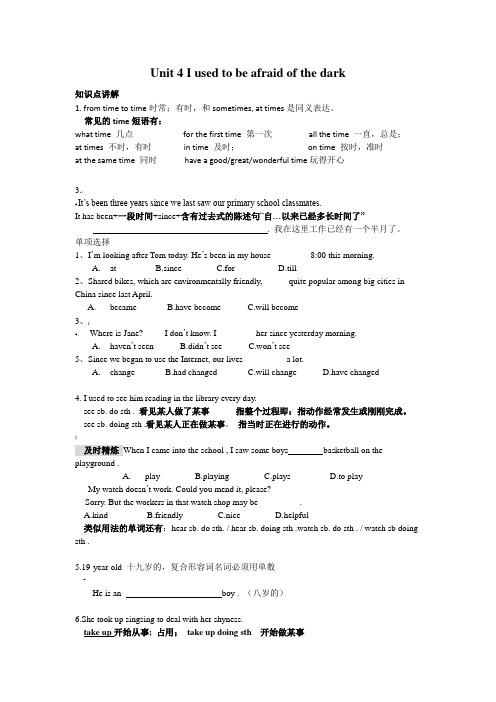
Unit 4 I used to be afraid of the dark知识点讲解1. from time to time时常;有时,和sometimes, at times是同义表达。
常见的time短语有:what time 几点for the first time 第一次all the time 一直,总是;at times 不时,有时in time 及时;on time 按时,准时at the same time 同时have a good/great/wonderful time玩得开心3.;4.It’s been three years since we last saw our primary school classmates.It has been+一段时间+since+含有过去式的陈述句“自…以来已经多长时间了”. 我在这里工作已经有一个半月了。
单项选择1、I’m looking after Tom today. He’s been in my house ________ 8:00 this morning.A.atB.sinceC.forD.till2、Shared bikes, which are environmentally friendly, _____ quite popular among big cities in China since last April.A.becameB.have becomeC.will become3、)4、---Where is Jane? ---I don’t know. I ________ her since yesterday morning.A.haven’t seenB.didn’t seeC.won’t see5、Since we began to use the Internet, our lives _________ a lot.A.changeB.had changedC.will changeD.have changed4. I used to see him reading in the library every day.see sb. do sth . 看见某人做了某事指整个过程即:指动作经常发生或刚刚完成。
九年级英语上册unit4知识要点
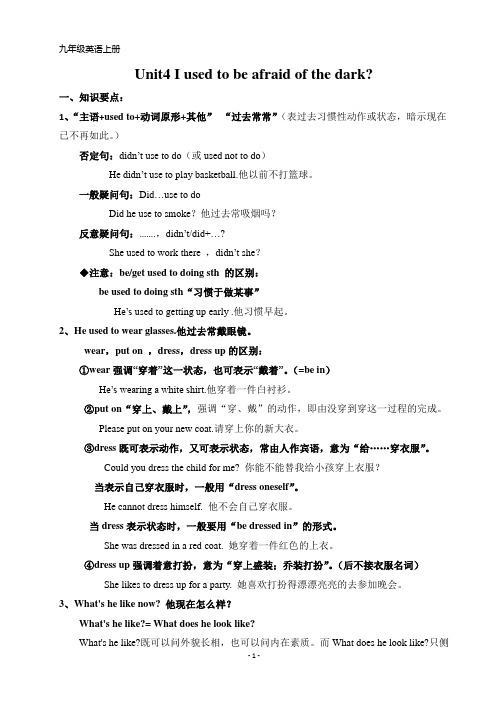
九年级英语上册Unit4 I used to be afraid of the dark?一、知识要点:1、“主语+used to+动词原形+其他”“过去常常”(表过去习惯性动作或状态,暗示现在已不再如此。
)否定句:didn’t use to do(或used not to do)He didn’t use to play basketball.他以前不打篮球。
一般疑问句:Did…use to doDid he use to smoke?他过去常吸烟吗?反意疑问句:…….,di dn’t/did+…?She used to work there ,didn’t she?◆注意:be/get used to doing sth 的区别:be used to doing sth“习惯于做某事”He’s used to getting up early .他习惯早起。
2、He used to wear glasses.他过去常戴眼镜。
wear,put on ,dress,dress up的区别:①wear强调“穿着”这一状态,也可表示“戴着”。
(=be in)He’s wearing a white shirt.他穿着一件白衬衫。
②put on“穿上、戴上”,强调“穿、戴”的动作,即由没穿到穿这一过程的完成。
Please put on your new coat.请穿上你的新大衣。
③dress既可表示动作,又可表示状态,常由人作宾语,意为“给……穿衣服”。
Could you dress the child for me? 你能不能替我给小孩穿上衣服?当表示自己穿衣服时,一般用“dress oneself”。
He cannot dress himself. 他不会自己穿衣服。
当dress表示状态时,一般要用“be dressed in”的形式。
She was dressed in a red coat. 她穿着一件红色的上衣。
人教版英语九年级上册 Unit 4 Section A (GF-4c)

Grammar Focus
Read the sentences.
I used to be short. Paula used to be really quiet.
I didn’t use to be popular in school.
She didn’t use to like tests.
You used to be short, didn’t you? Yes, I did. / No, I didn’t.
一般疑问句 Did + 主语 + used to be / do + 其他? eg. Did this building use to be a hotel?
这栋建筑物以前是一个酒店吗? Did you use to go to the library regulaly? 你以前经常去图书馆吗?
反义疑问句 主句 + didn’t + 人称代词? eg. Your brother used to have noodles as breakfast, didn’t he?
➢ Key sentences: 1. Grace used to watch a lot of TV. She didn’t use to watch a lot of movies. 2. Emily didn’t use to eat a lot of vegetables, but now she loves carrots and tomatoes.
英语unit4九年级全一册笔记

英语unit4九年级全一册笔记一、介绍Unit 4是九年级全一册英语教材中的一个重要单元。
该单元主要涵盖了旅行和交通相关的词汇和语法,同时也包括了一些与旅行相关的文化知识和常用表达。
学习这个单元可以帮助学生提高他们关于旅行和交通的英语表达能力,同时也有助于丰富他们对不同文化的了解。
二、重点词汇1. journey (n.) 旅行2. destination (n.) 目的地3. sightseeing (n.) 观光4. transport (n.) 交通工具5. amodation (n.) 住宿6. reservation (n.) 预订7. departure (n.) 出发8. arrival (n.) 到达三、语法要点1. 现在进行时:表示现阶段正在发生的动作或状态。
e.g. We are taking a trip to Beijing next week.2. 一般过去时:表示过去某个时间内发生的动作或状态。
e.g. They visited the Great Wall last year.3. 情态动词can/could:表示能力、请求、许可等。
e.g. I can speak English fluently.四、典型句型1. How long have you been in Beijing?2. What are you going to do there?3. Would you mind taking the window seat?五、文化知识1. 我国的交通工具有地铁、高铁、公交车等,而外国也有地铁、火车、飞机等不同的交通工具。
2. 在一些西方国家,人们会习惯性地握手问候。
而在我国,人们会用双手合十作为问候的方式。
六、环节安排1. 学生阅读相关课文,理解基本内容和语法要点。
2. 学生进行对话练习,模拟旅行场景,增加语言运用能力。
3. 学生自主积累相关词汇,写作旅行计划或游记。
沪教版英语九年级上册知识点总结UNIT 4 Problem and advice(附答案)

(be) on a diet
节食
2
laugh at
嘲笑
3
be/feel ashamed of
对……感到惭愧
4
drive sb. Mad
让某人受不了
5
make a mess
搞得一塌糊涂
6
out of place
格格不入
7
none of one's business
与某人无关
8
hear from
收到某人的信件
[ˈkɒment]
n.评论
19
request
[rɪˈkwest]
n.要求,请求
20
polite
[pəˈlaɪt]
adj.有礼貌的
21
none
[nʌn]
pron.没有一个,毫无
22
exam
[ɪg'zæm]
n.考试
23
(be)on a diet
节食
24
laugh at
['lɑːfət]
嘲笑,讥笑
25
feel ashamed of
UNIT4 Problem and advice
一、词汇短语学习
(一)课内单词
序号
单词
音标
中文意思
1
online
[ˌɒnˈlaɪn]
adj.在线的
2
model
[ˈmɒdl]
n.模特儿
3
diet
[daɪ]
n.规定饮食(为健康或减肥等目的)
4
though
[ðəʊ]
conj.虽然,尽管
5
awful
[ˈɔːfʊl]
2020人教版九年级英语上Unit4课文及详解

【文库独家】Unit 4 I used to be afraid of the darkLanguage Goal:Talk about what you used to be likeSection A1b Listen. Bob is seeing some friends for the first time in four years. What did his friends use to look like?1. Mario used to be . He used to wear .2. Amy used to be . She used to have .3. Tina used to have and hair .1c Look at the picture in 1a and make conversations.A: Did Mario use to be short?B: Yes, he did. He used to be really short.A: What’s he like now?B: He’s tall now.2a Listen and check (✔) the words you hear.friendly outgoing serioushumorous silent activebrave quiet helpful2c Make conversations about Paula using the information in 2b.A: Paula used to be really quiet.B: I know. She was always silent in class.2d Role-play the conversation.Alfred: This party is such a great idea!Gina: I agree. It’s been three years since we last saw our primary school classmates.Alfred: It’s interesting to see how people have changed.Gina: Billy has changed so much! He used to be so shy and quiet.Alfred: Yeah, his face always turned red when he talked to girls!Gina: I used to see him reading in the library every day.Alfred: That’s because he was a really good student. He s tudied hard and got good scores on his exams.Gina: Did he use to wear glasses?Alfred: Yes, and he used to be thin, too. But look how big and strong he is now!Gina: He’s so popular now. Look at all the girls around him!艾尔弗雷德:这次聚会是如此好的一个主意!吉娜:我同意。
2022-2023学年仁爱版九年级英语(上学期)Unit4知识点汇总课件
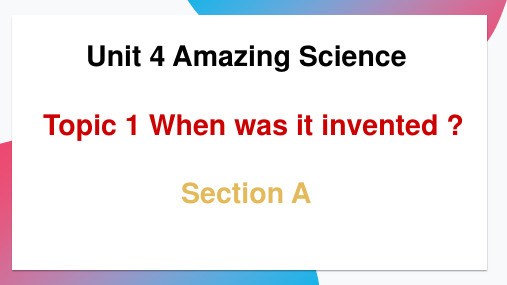
A .Camera B. Lift C. MP3 player
( B)5 .We should spend more time ___because it’s too
important.
A .to learn English B. learning English C. in English
3. A Journey to West _is__sh_o_w_n__ (show) on CCTV
every summer. 4.On Christmas Day, children wake up early
and can’t wait _t_o_o_p_e_n (open) the boxes of presents. 5. We’ll have a chance _t_o_s_e_e (see) the flower show this weekend.
(C )2.We all know that paper ___wood.
A. is made of B. is made into C. is made from
( C )3.This kind of machine ___in 2006.
A. is invented B. is made C. was invented
1.My mother allows me to use her cellphone.(改为被动语 态) I _a_m___ a_l_lo_w__e_d __t_o__ use my mother’s cellphone.
2.A rocket is used for launching satellites and spaceships. (就画线部分提问)
[荐]人教版九年级英语上Unit4单词、知识梳理、词汇句式精讲
![[荐]人教版九年级英语上Unit4单词、知识梳理、词汇句式精讲](https://img.taocdn.com/s3/m/a68d8ae0a8956bec0875e312.png)
人教版九年级英语上Unit4单词、知识梳理、词汇句式精讲一、Unit4 单词humorous [ˈhjuːmərəs] 有幽默感的;滑稽有趣的silent [ˈsaɪlənt] 不说话的;沉默的helpful ['helpfəl] 有用的;有帮助的from time to time [frɒm//taɪm//tuː//taɪm] 时常;有时score [skɔː] 得分;打分background [ˈbækɡraʊnd] 背景interview [ˈɪntəvjuː] 采访;面试n.Asian [ˈeɪʃ(ə)nˌˈeɪʒ(ə)n] 亚洲的;亚洲人的,亚洲人deal with 对付;应付dare [deə] 敢于;胆敢private [ˈpraɪvɪt] 私人的;私密的guard [ɡɑːd] 警卫;看守v.守卫;保卫require [rɪˈkwaɪə] 需要;要求European [jʊərəˈpiːən] 欧洲的;欧洲人的British ['brɪtɪʃ] 英国的;英国人的speech [spiːtʃ] 讲话;发言ant [ænt] 蚂蚁insect [ˈɪnsekt] 昆虫influence [ˈɪnflʊəns] 影响seldom [ˈseldəm] 不常;很少proud [praʊd] 自豪的;骄傲的be proud of 为⋯⋯骄傲;感到自豪absent [ˈæbsənt] 缺席;不在fail [feɪl] 失败;未能(做到)examination [ɪgˌzæmɪ'neɪʃən] 考试;审查boarding school 寄宿学校in person 亲身;亲自exactly [ɪg'zæktli] 确切地;精确地pride [praɪd] 自豪;骄傲take pride in 为⋯⋯感到自豪grandson [ˈɡrændsʌn] 孙子;外孙general [ˈdʒenər(ə)l] 普遍的;常规的;总的将军introduction [ɪntrəˈdʌkʃ(ə)n] 介绍Paula 葆拉(女名)Alfred 艾尔弗雷德(男名)Billy 比利(男名)Candy 坎迪(女名)Jerry 杰里(男名);杰丽(女名)Emily 埃米莉(女名)二、Unit4 知识梳理Unit4 I used to be afraid of the dark.【重点短语】ed to do 过去常常做2.deal with 对付应付3.be proud of 为……骄傲,感到自豪4.take pride in 为……感到自豪5.from time to time 时常,有时6.in public 公开地7.in person 亲身,亲自8.take up sth 开始做,接受,占用9.not……anymore 不再10.worry about 为……担忧11.hang out 闲逛12.think about 考虑13.be alone 独处14.on the soccer team 在足球队15.no longer 不再16.make a decision 做决定17.to one’s surprise 令某人吃惊的是18.even though 尽管19.pay attention to 对……注意,留心20.in the last few years 在过去的几年里21.be afraid of 害怕22.turn red 变红23.tons of attention 很多关注24.be careful 当心25.give up 放弃26.a very small number of …极少数的……27.give a speech 作演讲28.all the time 一直总是29.be interested in 对……感兴趣30.change one’s life 改变某人的生活31.take care of 照顾32.one of…, ……之一【重点句型】1. I used to be afraid of the dark.我过去常常前害怕黑暗.2.I go to sleep with my bedroom light on.我开着卧室的灯睡觉.3. I used to spend a lot of time playing games with my friends.以前我常常花很多时间和我的朋友们玩游戏.4. I hardly ever have time for concerts.我几乎没有时间去听音乐会.5. My life has changed a lot in the last few years.我的生活在过去几年里改变了很多.6. It will make you stressed out.那会使你紧张的.7. It seems that Yu Mei has changed a lot.玉梅似乎变化很大.三、词汇精讲1. silentsilent是形容词,意为“沉默的;无言的”,其名词形式为silence。
Unit4知识点讲解及练习牛津译林版英语九年级上学期

9A Unit4 Growing up知识点梳理词性转换lead领导(v./n.)→leader领导者(n.)simple简单的(adj.)→simply简单地,仅仅(adv.)nation国家,民族(n.)→national国家的(adj.)success成功(n.)→successful成功的(adj.) successfully成功地(adv.) succeed成功(vi.)achieve实现,达成(vt.)→achievement成就(n.)survive幸存(vt.)→survivor幸存者(n.)usual寻常的(adj.)→unusual不同寻常的(adj.)die死亡(vi.)→dead死亡的(adj.) dying临死的(adj.) death死亡(n.)短语、句型归纳1.What’s on your mind? 你有什么心事?on one’s mind 挂在心上,惦念in one’s mind 在某人看来make up one’s mind 下定决心change one’s mind 改变主意2. Growing up is hard! 长大真难啊!3. What’s up?=What’s the matter?=What’s wrong? 怎么了?4. build another one for yourself 为你自己建造另一个(房屋)build sth. for sb. 为某人建造某物5.Don’t wake me up until you finish building it. 直到你造完(房屋)再叫醒我。
finish doing sth. 完成做某事6. allow me to learn about people in different times and places使我能了解不同时期和地方的人allow doing sth. 允许做某事7. read them whenever I want to 无论何时我想读就读他们8. learn about the world through the Internet 通过因特网了解世界9. As soon as you click t he mouse, there’s a great deal of information.你一点击鼠标,就会有大量信息。
苏教版九年级上册英语unit4知识点
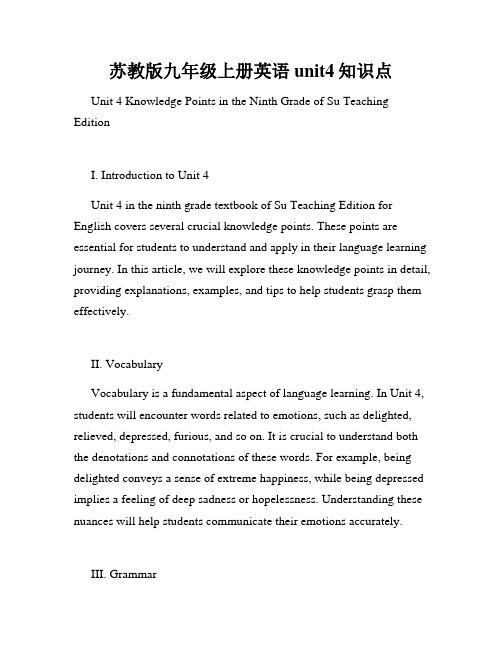
苏教版九年级上册英语unit4知识点Unit 4 Knowledge Points in the Ninth Grade of Su Teaching EditionI. Introduction to Unit 4Unit 4 in the ninth grade textbook of Su Teaching Edition for English covers several crucial knowledge points. These points are essential for students to understand and apply in their language learning journey. In this article, we will explore these knowledge points in detail, providing explanations, examples, and tips to help students grasp them effectively.II. VocabularyVocabulary is a fundamental aspect of language learning. In Unit 4, students will encounter words related to emotions, such as delighted, relieved, depressed, furious, and so on. It is crucial to understand both the denotations and connotations of these words. For example, being delighted conveys a sense of extreme happiness, while being depressed implies a feeling of deep sadness or hopelessness. Understanding these nuances will help students communicate their emotions accurately.III. GrammarGrammar is the backbone of any language. In Unit 4, students will focus on the formation and usage of the present perfect tense. This tense is used to describe actions or events that happened in the past but have a connection to the present. For example, "I have visited France" indicates that the action of visiting happened at some point in the past, but the experience still has relevance to the present. Along with the present perfect tense, students will also learn about the difference between the present perfect and simple past tenses, enabling them to choose the appropriate tense in various situations.IV. Reading ComprehensionUnit 4 includes a reading comprehension passage that allows students to improve their reading skills while expanding their knowledge. Students will learn how to identify the main idea, analyze supporting details, and infer information not explicitly stated in the text. Additionally, they will practice their ability to summarize the text and make connections between the reading material and their personal experiences or real-world events. Developing these skills is vital for success in English language comprehension.V. Writing SkillsWriting skills are essential for effective communication. In Unit 4, students will learn how to write a diary entry. They will focus onexpressing their thoughts, emotions, and reactions to specific events or situations they have encountered. Guided practice in writing diary entries will help students become more proficient in using appropriate vocabulary, grammar structures, and cohesive devices. By reflecting on their daily experiences through writing, students can enhance their language proficiency and develop a personal voice in their compositions.VI. Listening and Speaking ActivitiesIn Unit 4, students will engage in various listening and speaking activities to enhance their oral communication skills. These activities may involve listening to dialogues, interviews, or speeches, and participating in conversations or group discussions. Through these exercises, students will practice their listening comprehension, speaking fluency, and the ability to express opinions, ideas, and emotions in English. Regular participation in these activities will improve their overall language proficiency and confidence.VII. Cultural AwarenessUnit 4 also aims to broaden students' cultural awareness by introducing them to different emotions and their cultural significance. Exploring how emotions are expressed and perceived in different cultures will promote a more comprehensive understanding andappreciation of diverse perspectives. Moreover, it will enable students to develop empathy, tolerance, and respect for other cultures.In conclusion, Unit 4 of the ninth-grade English textbook in the Su Teaching Edition covers vocabulary, grammar, reading comprehension, writing skills, listening, speaking activities, and cultural awareness. By mastering these knowledge points, students will enhance their language proficiency, critical thinking skills, and cultural understanding. It is crucial to invest time and effort into studying and applying these points effectively, as they will serve as a solid foundation for future language learning endeavors.。
9年级上册英语Unit 4

9上Unit 4 Growing up一、复习单词表A.拼读易错单词、重点单词through,deal,leader,university,succeed,remain,matter,against,career,record,German,thought,courage,surprise,researchB.重要单词用法1、whenever,through,stand,although,university,matter,victory,spirit2、mind①名词:头脑。
on o ne’s mind意为“挂在心上,惦念”②名词:思想,想法。
常见的短语有:change one’s mind改变主意make up one’s mind下定决心③动词:介意,反对,常用来表示委婉、客气的请求。
常用短语:mind doing sth/mind sb doing sth/mind one’s doing sth介意做某事Never mind没关系,不要紧(1)—Mary is ill.When shall we go to see her,tonight or tomorrownight ?—____.Either night is OK.A、I'm sureB、I'm afraid notC、I don't knowD、I don't mind(2)—It's too hot.Would you mind my____the window ?—____.Do it as you like , please !A、to open ; OKB、opening ; Certainly notC、closing ; Of courseD、open ; Good idea(3)What do you think made him __________________________ (改变了主意)?(4)He made up his mind__________(learn)English well yesterday.3、time:①时代,in different times②时间,不可数名词③次数,可数名词常用短语有:all the time一直at times有时at the same time同时from time to time有时in time及时on time按时at a time一次have a good time玩的高兴(1)We can’t do two things well_________.A、On timeB、in timeC、at a timeD、all the time(2)This is the third time I___________(be)to Beijing.4、a great deal“大量,许多“,可单独使用,也可以用在形容词或副词的比较级前面;还可以修饰不可数名词。
九年级上册unit4英语知识点详解
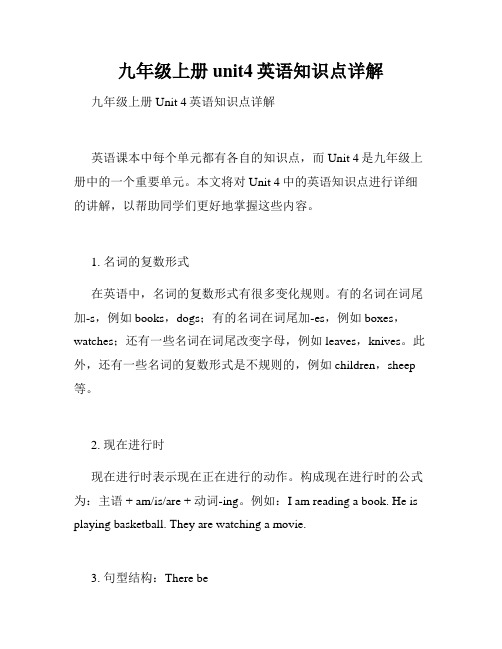
九年级上册unit4英语知识点详解九年级上册Unit 4英语知识点详解英语课本中每个单元都有各自的知识点,而Unit 4是九年级上册中的一个重要单元。
本文将对Unit 4中的英语知识点进行详细的讲解,以帮助同学们更好地掌握这些内容。
1. 名词的复数形式在英语中,名词的复数形式有很多变化规则。
有的名词在词尾加-s,例如books,dogs;有的名词在词尾加-es,例如boxes,watches;还有一些名词在词尾改变字母,例如leaves,knives。
此外,还有一些名词的复数形式是不规则的,例如children,sheep 等。
2. 现在进行时现在进行时表示现在正在进行的动作。
构成现在进行时的公式为:主语 + am/is/are + 动词-ing。
例如:I am reading a book. He is playing basketball. They are watching a movie.3. 句型结构:There beThere be句型是英语中常用的表达事物存在的句子结构。
它的基本结构为:There be + 某物 + 单数/复数动词。
例如:There is a cat in the garden. There are many flowers in the park.4. 情态动词情态动词是英语中一类特殊的动词,用来表示能力、可能性、必要性等。
情态动词包括can,could,may,might,must等。
例如:She can swim. You must finish your homework.5. 定语从句定语从句是用来修饰名词的从句。
它通常由关系代词who,which,that引导。
例如:The girl who is wearing a blue dress is my sister. The book that I borrowed from the library is very interesting.6. 状语从句状语从句是用来修饰动词、形容词或副词的从句。
- 1、下载文档前请自行甄别文档内容的完整性,平台不提供额外的编辑、内容补充、找答案等附加服务。
- 2、"仅部分预览"的文档,不可在线预览部分如存在完整性等问题,可反馈申请退款(可完整预览的文档不适用该条件!)。
- 3、如文档侵犯您的权益,请联系客服反馈,我们会尽快为您处理(人工客服工作时间:9:00-18:30)。
Section A,1b
Girl 1: Hey,did you see this newspaper article? An old man had a million dollars And he gave it to charity.
Boy 1: Wow,what a nice man!
Bill: Oh?How didyou do,Celia?
Celia: I don't know yetBut it's a really interesting test.You should try it,Bill.
Bill: OK.
Celia: How about question 1?What would you do if the teacher asked you to give a speech in front of the whole school.
Bill: Mm,I'd say I had a cold and couldn't speak.I would be afraid to make a speech in front of the whole school.
Celia: How about this movie question>What would you do if some one asked you to be in a movie?
Girl: If I were you,I'd wear a shirt and tie.
Larry: What if everybody else is wearing jeans and T-shirts?
Girl: Oh,you shouldn't worry about what other people are wearing.
Girl 1: What would you do ig you had a million dollars?
Boy 1: If I had a million dollars,I'd give the money to the zoo.I want to help the pandas.
Girl 1: That's a good idea!I know what I'd do.I'd buy a big house for my family.
2a,2b
Girl: Where are you going,Larry?
Larry: To Tom's party.
Girl: Lucky you!I'd love to go to that party!
Larry: Yeah,Well,I'm a little nervous.I don't know what to wear.
Bill: Oh,I'd say"no",I'd be too ner vous .What's the next question?
Celia: Let's see...
Girl; Look!you're sure to have fun.But if you're still nervous,you can leave.
Section B 2a,2b
Celia: I just did a personality survey in Teen Time magazine.It tells you how confident you are.
Girl 2: Really?I'd pot the money in the bank. Then I'd just watch it grow!
Boy 2oney to medical research.I'd want to help other people.
Larry: And I'don't have a present.What if every one bring a present?
Girl: If I were you,I'd take a small present-a pen or something.Keep it in your pocket and if everyone has a present,you can give him yours.If not,you can keep it.
Larry: OK.But what if I don't know anyone?
Girl: If you don't know anyone,you can talk to Tom.He'll introduce you to people.
Larry: I guess I can do that.
